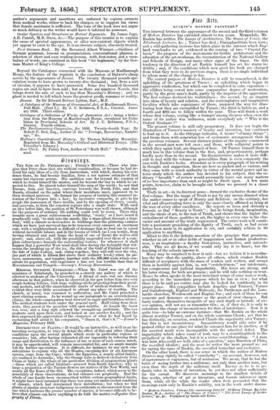&leanings.
THE SITE OP Sr. PETERSBURG ; PETER'S MOTTVE.—Those who ima- gine that Peter chose that site without consideration, or because he had de- rived his only ideas of a city from Ameterdam, with which, during his resi- dence there, he had become familiar, form a too narrow estimate of that coarse but vigorous genius. His ambition rose far beyond the country of which he found himself the master, and far beyond the day in which he ex- pected to live. He placed before himself the map of the world; he saw that Europe, Asia, and America, converge towards the North Pole, and that Russia, situated on the point where their meridians meet, appeared to be their destined mistress. He formed the purpose of turning this assumed in- tention of the Creator into a feet ; by successive conquests, to give to his people the possession of three 'worlds, and by the opening of rivers, canals, and 'caravans, to form the remotest regions into a single state. With such an idea before him, the position of St. Fetentburg was -well chosen, although for the purposes of ordinary life nothing could well be worse. There they se, tremble upon a great subterranean scaffolding, ' ready ' as I have heard it graphically said, to sink into the marsh, like a stage-ghost through a trap- door,' with a climate so destructive to buildings that e glittering exterior which we have just surveyed has to be renewed every summer at enormous vest, with a neighbourhood so difficult of drainage that no food can be ritised without incredible labour, and in the forests of which (as I can testify, from having obtained and sent home the head of one of them) the wolves still prowl; and, above all, with the possibility suspended over them of a cons- 'Ade submergence beneath the surrounding waters ; for whenever it shall happen that a powerful West wind shall blow during the fortnight that wit- nesses the breaking up of the ice, the tide of the Gulf of Finland will meet the tide of Lake Ladoga, and rising together, they will roll over the city, (no part of which is fifteen feet above their ordinary level;) when its pa- laces, monuments, and temples, together with the 400,000 souls which con- stitute its population, will experience a fete not less terrible than that of Herculaneum and Pompeii.—Gurney's Evening Recreations.
MEDICAL STUDENTS ENTRANCED.--When Mr. Caird was one of the ministers of Edinburgh, he preached inn church one gallery of which is allotted to students of the University. A friend of ours was one Sunday afternoon in that gallery, when he observed * the pew before him two very rough-looking fellows, with huge walking-sticks projecting from their great- coat pockets, and all the unmistakeable marks of medical students. It was evident they were little accustomed to attend any place of worship. The church, as usual, was crammed to suffocation, and Mr. Caird preached a most stirring sermon. As he wound up one paragraph to an overwhelming climax, the whole congregation bent forward in eager and breathless silence. The medical students were under the general spell. Half rising from their seats, they gazed at the preacher with open mouths. At length the burst was over, and a long- sigh relieved the wrought-up multitude. The two students sank upon their seat, and looked at one another fixedly ,• and the first expressed his appreciation of the eloquence of what he had heard by exclaiming half aloud to his companion, "Damn it, that's it !"—Fraser'e
Mage=ine, February 1856. •
DISTRIBUTION OP Frasyrs.—It would be an instructive, as well as an in- teresting occupation, to trace in detail the effect of this and other climatic conditions upon the several plants which occur in particular regions or countries- but, after having exhausted all our ingenuity in refemng their range and distribution to the influence of one or more of such causes, much, it may be apprehended, will remain unaccounted for, and an ample margin left for further speculation. It is difficult, for instance, by any such con- siderations to explain why all the Reatha, excepting five or six European species come from the Cape ; whilst the g. pacrise4, a nearly allied family, are confined to Australia ; why the Orange tribe is derived exclusively from China or India ; the whole of one particular division of syngenesious plants —those which are called bilabiate--proceed from South America ; why so large a proportion of the Passion-flowers are natives of the New World, and nearly all the Roses of the Old. The exceptions, indeed, which occur to the generality of these observations, do but enhance our perplexity. Had the whole of one family been circumscribed within certain geographical limits, it inir,ht have been surmised that there was some yet undiscovered condition of climate, which had determined their distribution ; but when we find plants of similar structure indigenous in continents so disconnected from the one which harbours the greater number of species, it becomes difficult to be- lieve that climate can have anything to do with the matter.—.Popular Geo- graphy cf -Plants.










































 Previous page
Previous page